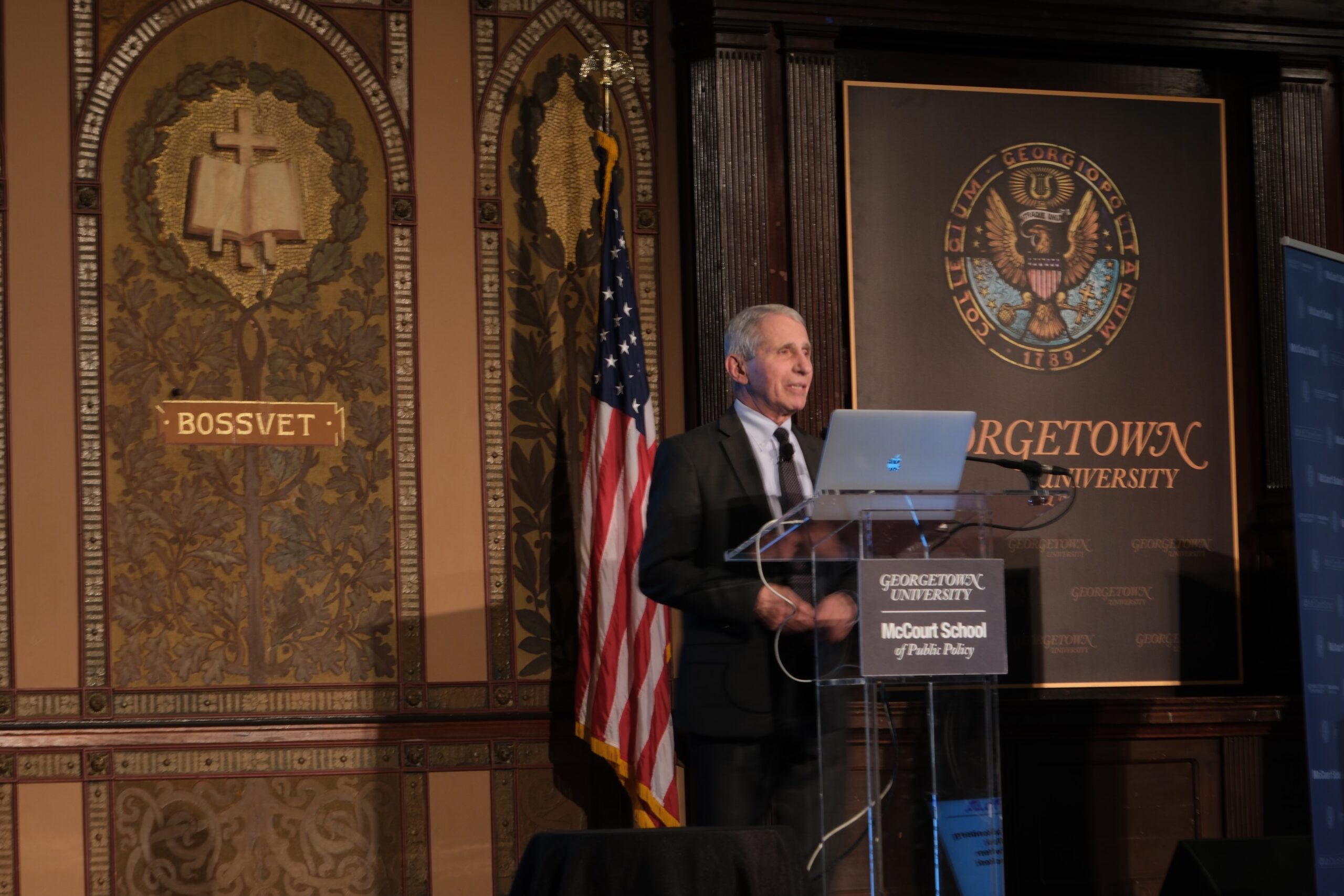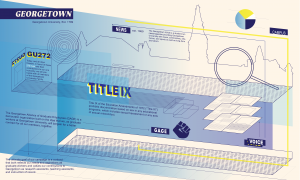On Feb. 1, Dr. Anthony Fauci delivered Georgetown’s 2024 Whittington Lecture, hosted by the McCourt School of Public Policy. The lecture, titled ‘Pandemic Preparedness and Response: Lessons from COVID-19,’ discussed the successes and failures of the U.S. and the global community in responding to the COVID-19 pandemic.
The event began with remarks from John DeGioia, Georgetown’s president, and Anirudh Srivathsan, McCourt’s 2024 Whittington Scholar. They both praised Fauci’s work in leading the country’s response to the pandemic.
“[Fauci’s] calm demeanor, clarity and communication, and steadfast commitment to truth had become a source of inspiration during a period of immense uncertainty,” Srivathsan said.
Fauci served as the director of the National Institute for Allergies and Infectious Diseases (NIAID) at the National Institutes of Health for nearly 40 years. A founding member of the White House Coronavirus Task Force, he became a household name as the White House’s de facto COVID-19 spokesperson, appearing on nationally televised press briefings to deliver guidance and updates.
Fauci retired from NIAID and his White House post in December 2022. This past summer, he joined Georgetown as a distinguished professor in the School of Medicine and the McCourt School of Public Policy.
Fauci’s remarks highlighted the 10 greatest lessons on pandemics he believed the international community learned from COVID-19, inspired by an article he wrote in April 2023 for The Journal of Infectious Diseases.
He began by acknowledging that the U.S.’s COVID-19 response was significantly hampered by a lack of preparedness for the potential of a global pandemic. This recognition has allowed Fauci and other researchers to develop a comprehensive pandemic response plan in the case of another global health emergency.
“When you first detect that you’re dealing with a pandemic, even though you only have a few cases, you’ve got to act like you’re going to get a tsunami because that’s what happens with pandemics,” he said. “For the next pandemic, we want to make sure that within 100 days of knowing you’re dealing with a pandemic, that you can have diagnostic tests, therapeutics, and at least the beginning of a vaccine that’s ready to ultimately be distributed.”
Although the U.S.’s lack of preparation dismayed Fauci, he expressed pride in the historically quick turnaround of the COVID-19 mRNA vaccine. He described a conversation in January 2021 with virologist Barney Graham, who made, what Fauci judged at the time, as a seemingly impossible promise.
“Barney Graham told me in my conference room on the NIH campus, ‘Tony, as soon as we get the genetic sequence of this virus, I’ll start making a vaccine in five days,’ which is crazy,” Fauci said. “So I said fine. On January 10, the sequence came out, and Barney came through with his promise five days after the sequence.”
Fauci also addressed misinformation as one of the greatest threats to curbing the spread of the pandemic. “Now, misinformation is the enemy of pandemic control, no doubt,” Fauci said. “It’s really, I think, one of the most important issues we’re facing that goes well beyond COVID.”
When asked in the question and answer session after the lecture about why skepticism towards health officials has become so rampant, Fauci lamented the consequences of the spread of misinformation and disinformation in the digital age.
“We are living in an era of what I call the normalization of untruths,” Fauci said. “And the misinformation and disinformation that spreads around is stunning to the point where if you normalize it and accept it, then truth has no value.”
Another key obstacle to pandemic control was disparities in healthcare access among minority communities, something Fauci touched on as evidence of wider systemic issues.
“Long-standing health and social inequities drive endemic disparities,” he said. “When you look at disparities with discrimination, limited healthcare access, occupation, people with a low socioeconomic level, minorities — African Americans and Hispanics among them — disproportionately work in essential jobs that put them right in the middle of a risk of getting infected.”
Fauci also cited systemic disparities in healthcare and information access as reasons why minority and low-income communities were less likely to receive a COVID-19 vaccine. He called these accessibility issues “a profound disparity in access to a life-saving intervention.”
Additionally, Fauci discussed new evidence that pandemic mortality rates were correlated with partisan affiliation, with mortality rates significantly higher among Republicans than Democrats.
Despite a difficult past four years, Fauci believes that the challenges of fighting COVID-19 taught him and the global community a key lesson.
“Emerging infectious diseases are a perpetual challenge,” he said. “The only way to be prepared for the perpetual challenge is by being perpetually prepared. And for me, that is the final and most compelling lesson that we’ve learned from COVID.”




